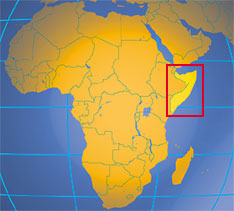Somalia
 Geological
Survey Department
Geological
Survey DepartmentMinistry of Minerals and Water Resources
P.O. Box 744, Mogadishu
CIA Factbook
Political rights and civil liberties (Freedom House)
Arabic-English online dictionary
Travel and accommodation
The contribution of mining to total exports in 2010 amounted to 33.4%
Somalia Mining News
Somalia is divided geologically into two broad regions, one in the extreme northwest which comprises mostly crystalline (Proterozoic) basement rocks and minor components of a Mesozoic sedimentary marine succession and the remainder of the country comprising dominantly sedimentary sequences. The latter can be subdivided into a southern region which consists of a Phanerozoic basin enclosing an inlier of Proterozoic metamorphics and a northern basin of Cenozoic age. The northern Somali crystalline basement consists of metasedimentary sequences and plutonic complexes recording a complex tectono-metamorphic history involving juvenile Pan-African crust and older reworked terranes.
Mining
Somalia’s mineral-mining output is an insignificant part of its economy. The mineral industry produces small quantities of gemstones, salt, gypsum and marble. Other natural resources include uranium and largely unexploited reserves of iron ore, tin, tantalum, gypsum, bauxite, copper, salt, sand & gravel, natural gas and possibly oil.
Oil & Gas
Proven natural gas reserves at the beginning of 2009 were estimated at 5.663 billion m3. Mineral production data is scant to non-existent.
Maps and images
- Somalia Cities,Towns, Airports, Maps, Images
- Somalia Image-1
- Somalia Image-2
- Somalia Minerals
- Available geological maps (35)
Somalia has no proven oil reserves, and only 200 billion cubic feet of proven natural gas reserves. Somalia currently has no hydrocarbon production. Oil seeps were first identified by Italian and British geologists during the colonial era. Exploration activities were focused in northern Somalia, and several foreign firms, including Agip, Amoco (now part of BP), Chevron, Conoco and Phillips, held concessions in the area. The firms all declared force majeure following the collapse of the central government.
Exploration activity remains hindered by the internal security situation, and the multiple sovereignty issues.
- Natural gas proved reserves: 5.663 billion cu m (1 January 2005 est.)
- In February 2001, Total signed an exploration agreement with the Transitional National Government (TNG). The twelve-month agreement granted Total the rights to explore in the Indian Ocean off southern Somalia. Hassan Farah, TNG's Minister for Water and Mineral Resources, stated that the government would provide security during the exploration activities. Several factional leaders denounced the agreement, and stated that the TNG did not have the authority to sanction the agreement, nor the power to guarantee the safety and security of the exploration operations.
- In May 2001, Somaliland signed an agreement with U.K.-registered Rovagold Ltd and two Chinese firms, Continental Petroleum Engineering Company (CPEC) and China Petrochemical Cooperation (CPC), for the right to explore for oil.
- Dubai-based Zarara Energy also signed an exploration agreement with Somaliland. The Somaliland government has said it will honor, until they expire, the existing contracts foreign companies signed with the Barre regime that are in their territory. None of the firms have resumed operations in Somaliland.
- Range Resources Corporation (NYSE: RRC) is exploring in Puntland. See video.
Uranium
Known occurrences at Alio Ghelle;Jach Brava (metasomatite) and Dusa Mareb (surficial).References
Economic geology of nonmetal deposits
- Lower Cretaceous weathering and prognosis for finding kaolin deposits in northwestern Somalia
- Sravnitel'naya kharakteristika kachestva prirodnogo p'yezoopticheskogo kvartsa po fizicheskim svoystvam i geologicheskiye faktory, opredelyayushchiye yego. Comparative characteristics of quality of natural piezoptical quartz, its physical properties, and controlling factors
Economic geology of ore deposits
- Les mines de fer mondiales et la préparation des minerais - Afrique
- Mineral deposits and occurrences in the precambrian of northeast Africa and Arabia: a review
- Sources of uranium; present and future; Australia's mineral energy resources, assessment and potential
- The Alio Ghelle radioactive mineral occurrence in the Bur region of the Republic of Somalia; a brief summary of the principal features; Uranium exploration geology
- The cassiterite deposits of Dalan, near Elayu, Erigavo District
- Tin deposits in Somalia
Economic geology, general
- Mineral and groundwater survey, Somalia
- Minerals and rocks of Hargeisa and Borama districts
- Note minerarie sulla Somalia; 28 maggio-11 giugno 1972; 10 ottobre-19 ottobre 1972. A mineralogical note on Somalia; May-June-October 1972
- Somalia
- The mineral industry of other African areas
- The Mineral Industry of Other African Areas
- The mineral industry of other areas of Africa
Economic geology, general, deposits
- Brief results of the Mineral and Groundwater Survey Project activities and recommendations on phase II
- Explanatory remarks to mineral and groundwater survey project in the Somali Republic
- Mineral and groundwater survey in Somalia
- Mineral and groundwater survey project
- Mineral and groundwater survey project Somalia; phase 1, 1964-1968
- Mineral and groundwater survey; phase II, 1969-1971, Interim report on project results and conclusion
- Mineral and groundwater survey; phase II, Goundwater in Somali Democratic Republic [modified]
- Mineral and groundwater survey; phase III, 1972-74, Project finding and recommendation
- Mineral and groundwater survey; phase III, geochemical and geological investigation in the northern province [modified]
- Proposals for a second phase "Mineral and groundwater survey project" of the Somali Government, to be executed with assistance of the United Nations Development Programme (Special fund)
- Semiannual reports by Mineral and Groundwater Survey Project, covered the period January 1, 1964 through August 31, 1967 (Reports 1-7)
Economic geology, general, economics
- Financing African mining developments; Mining activity survey
- Les mines de fer mondiales et la préparation des minerais - Afrique
Economic geology, geology of nonmetal deposits
- Building materials in the Banadir District; problems of quarry exploitation and environmental protection
- Results of hydrogeological work carried out in 1966 on the Modu-Mode apatite occurrence


